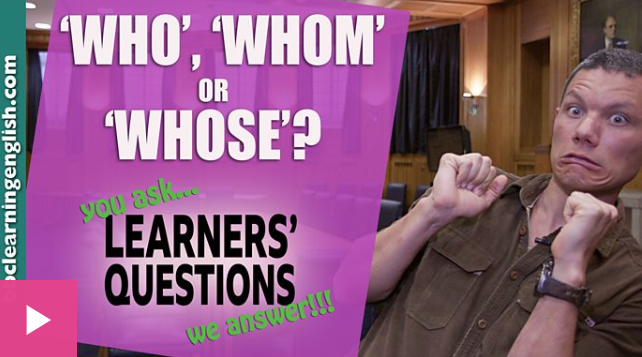This week’s question
What’s the difference between ‘who’, ‘whom’ and ‘whose’? – Rodolfo from Brazil
Answer this
Complete the sentence: “The student ______ (who, whom, whose) dog has run away, has gone to look for it.”
Language points
Question words:
Who, whom and whose are interrogative pronouns.
Who asks about a person and works as a subject or an object.
- Welcome to BBC Learning English. Who do you know?
Whom asks about a person but only when it is an object – it’s an object pronoun. It’s quite formal and it’s used more in writing. When you write to a company but you don’t know to which person to send it to, you write at the top: To Whom It May Concern.
Whom is often used with a preposition (very formal):
- To whom did you speak yesterday?
Whose is a question word and is used to ask about possession. It functions like ‘my’, ‘his’ ‘her’ etc and it must be followed by a noun.
- Whose phone is this?
Relative clauses:
There are two types of relative clauses: defining relative clauses (specify which noun we are talking about) and non-defining relative clauses (add extra, non-essential, information to a noun.
Who and whom are relative pronouns that represent a person within a relative clause.
Who is a personal pronoun in a relative clause and can be used as the subject or object.
- The person who lives uplstairs is very noisy. (who is the subject)
- John’s the guy who you met yesterday. (who is the object)
Whom is the object form of who. It represents a person that is the object of the relative clause. Whom is mostly formal and mostly used in a written style.
- The person whom I spoke to denied making noise.
The position of the preposition is important for formality. For the most formal version, put the preposition before whom.
- The person to whom I spoke denied making noise.
Whose is used to talk about possessions. It’s a prossessive relative pronoun and it must be followed by a noun.
- I know a baker whose cakes are delicious. (a person’s possession)
- It’s the story of a dog whose best friend is a cat! (an animal’s ‘possession’)
- That’s the tree whose branches look like a ghost! (an object’s ‘possession’)
The answer
“The student whose dog has run away, has gone to look for it.”
